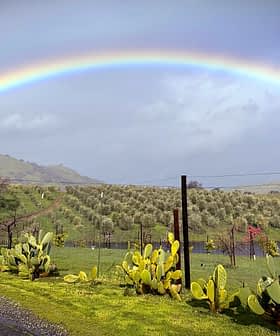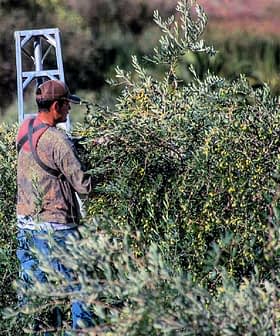Gold Rush II: Competition for California Olives Leaves Some Smaller Producers Fruitless
Top-dollar offers from California's Aussie newcomer are tilting the table away from smaller producers in the state.
Boundary Bend Limited, an Australia-based producer of the Cobram Estate brand, is aggressively securing fruit from California olive growers to expand its U.S. market share, causing established relationships between farmers and smaller producers to be abruptly ended. Despite the negative impact on smaller businesses, some believe that Boundary Bend’s aggressive tactics may actually benefit the industry by ensuring that farmers receive higher prices for their olives, potentially leading to increased production and planting of additional acreage.
To quench the rapidly expanding American thirst for high-quality extra virgin olive oil, the competition for olives in California has become fierce.
Growers and producers say Boundary Bend Limited, the Australia-based producer of the Cobram Estate brand, has been offering top dollar contracts and aggressive terms to secure fruit for its U.S. expansion, putting a sudden end to established relationships between farmers and some smaller producers.
I lost an important orchard to them this week, in the middle of production.
Each year Americans consume more than 300,000 tons of olive oil, but less than 5 percent of it is made here. That spells a huge opportunity for domestic producers led by California Olive Ranch and Boundary Bend as they set their sights on building market share while backing initiatives aimed at educating consumers on the quality of local oils and leveling the playing field with imported products.
Boundary Bend, led by Rob McGavin, who did not respond to a request for comment for this article (nor did his head of California operations, Adam Englehardt), has had bankable success in Australia where the market share of domestic oils rocketed from near zero to over 30 percent in recent years. Vigorous campaigning by the local industry cast suspicion on the integrity of imported oils and lured shoppers to consider homegrown options, while the company’s Cobram Estate brand garnered international acclaim for quality, winning a string of awards at major competitions.
Sources say the olive land grab by the well-funded Boundary Bend has led some growers in California to discontinue supplying fruit to smaller millers in the state with little or no warning. “They’re paying very high prices and disregarding existing work relationships. I lost an important orchard to them this week in the middle of production,” one miller told Olive Oil Times. “Of course, the owner of the orchard was as responsible as (Boundary Bend) for this unprofessional decision. It’s hard to reconcile their rhetoric in favor of the industry with the way they went around and harmed our business and presumably others.”
Boundary Bend has been offering $850 per ton for Mission olives (which last year fetched $700 – 725), telling producers they can pay more because they have the machinery to reuse the paste (for other cooking oil applications) and generate higher yields. They’re paying $800 for the Manzanillo variety (which went for $600 last season), pricing out even table olive buyers, according to a producer familiar with the terms.
“No doubt they’re creating bad blood in the industry,” said a miller who wished not to be named. “I’m glad growers can make more money though I don’t appreciate this way of doing things. They visited every single orchard we work with.”
The state’s largest producer, California Olive Ranch (COR), was not mentioned by several sources as a cause of the current consternation. The company’s CEO, Gregg Kelley, said, “It’s been an unwritten rule that the large producers should work together with smaller ones to build the industry. COR will continue to form long-term grower partnerships, increase farm-gate returns for everyone, and build the market for quality EVOO, rather than diverting attention to the aggressive practices of competitors.”
But while COR has not had to resort to building its network of 70 growers with top-dollar enticements, it may have more to do with the company’s unique business strategy than any moral high ground: COR has turned to imported oils to fulfill orders through its acquisition of the Lucini brand of Italian oils and a broad range of products of various origins.
“We are having a lot of success outside of our ‘core’ California business,” Kelley said. “Many customers see us as a trusted source for quality EVOO, and we are looking to achieve different flavor profiles and price points beyond our current Californian and Italian offerings.”
While growers and millers throughout the state are feeling the impact of an increasingly aggressive pursuit of fruit, not everyone agrees it spells the demise of small businesses in the sector.
“I will confirm it has had a direct and significant impact on our business,” a mid-sized producer in the state said. “But I believe the ‘Boundry Bend problem’ may actually save the industry. For the first time, farmers are receiving a price for their olives that will ensure they keep them in the ground and consider planting additional acreage.”





